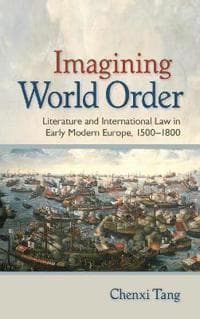
Imagining World Order
910 kr
910 kr
Ma., 30 juni - fr., 4 juli
Sikker betaling
14 dagers åpent kjøp
Selges og leveres av
AdlibrisProduktbeskrivelse
In early modern Europe, international law emerged as a means of governing relations between rapidly consolidating sovereign states, purporting to establish a normative order for the perilous international world. However, it was intrinsically fragile and uncertain, for sovereign states had no acknowledged common authority that would create, change, apply, and enforce legal norms. In Imagining World Order, Chenxi Tang shows that international world order was as much a literary as a legal matter. To begin with, the poetic imagination contributed to the making of international law. As the discourse of international law coalesced, literary works from romances and tragedies to novels responded to its unfulfilled ambitions and inexorable failures, occasionally affirming it, often contesting it, always uncovering its problems and rehearsing imaginary solutions.
Tang highlights the various modes in which literary texts—some highly canonical (Camões, Shakespeare, Corneille, Lohenstein, and Defoe, among many others), some largely forgotten yet worth rediscovering—engaged with legal thinking in the period from the sixteenth to the eighteenth century. In tracing such engagements, he offers a dual history of international law and European literature. As legal history, the book approaches the development of international law in this period—its so-called classical age—in terms of literary imagination. As literary history, Tang recounts how literature confronted the question of international world order and how, in the process, a set of literary forms common to major European languages (epic, tragedy, romance, novel) evolved.
Artikkel nr.
1024dde9-f575-5a3c-a433-cb2d72417a30
Imagining World Order
910 kr
910 kr
Ma., 30 juni - fr., 4 juli
Sikker betaling
14 dagers åpent kjøp
Selges og leveres av
AdlibrisLignende toppselgere

Øreputer for Bose QuietComfort - QC35/QC25/QC15/AE2 Hodetelefoner Svart
99 kr

3-Pak - Fidget Spinners med Sugekopp for Barn
119 kr
Tidligere laveste pris:
139 kr

INF TYPE-C Dual SD/TF-kortleser for rask dataoverføring 0
99 kr

Luftrenseenhet - Renser / Saniterer luften - 20,000 mg/h
599 kr

INF Tilbehør Xiaomi Roborock S5 Max/S50/S51/S55/S5/S60/S65/S6/S6 Pure/S6 MAXV 22 deler
281 kr
Tidligere laveste pris:
351 kr

INF Støydempende og lydisolerende ørepropper med krok
114 kr
Tidligere laveste pris:
143 kr

Hundetrimmer / Potetrimmer - Trimmer for Poter
199 kr

Sony | Playstation® 5 Slim (Digital-versjon) - Spillekonsoll - 1TB SSD NVme - Wi-Fi/LAN - Hvid
5 724 kr

Filter for MSPA oppblåsbare bassenger FD2089 4-pakning
275 kr
Tidligere laveste pris:
365 kr

Universallader for Garmin klokker Svart
89 kr
Anbefalinger til dig

Just när du trodde allt var över - Boken om Ripp-Rock
234 kr
Tidligere laveste pris:
236 kr

Playstation 5 DualSense Controller Midnight Black
799 kr

RCA til HDMI Converter 1080p - Adapter
139 kr

2-Pak - Lader for iPhone - Hurtiglader - Adapter + Kabel 20W USB-C
199 kr

Stimulerende Leke for Barn – Aktivitetsleke
199 kr

Malibu Fast Tanning Bronzing Butter with Beta Carotene 300ml
179 kr

Afnan Supremacy Collector's Edition Eau De Parfum 100 ml (man)
673 kr
Tidligere laveste pris:
762 kr

INF Spiralreflekterende fugleskremsel 10-pakning Sølv 30 cm
143 kr
Tidligere laveste pris:
190 kr

K18 Leave-In Molecular Repair Hair Mask 150 ml
1 071 kr

Trådløs CarPlay-adapter 2025
299 kr
Tidligere laveste pris:
379 kr